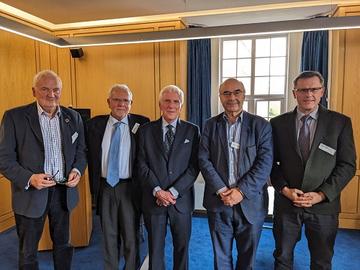Oxford History of Science turns 50

Nik Gowing, Pietro Corsi, Robert Fox, David Edgerton, Rob Iliffe
Oxford History of Science turns 50
The 50th anniversary of the creation of the first Statutory Chair in History of Science at Oxford was celebrated with a two-day event between 25 and 26 September. Organised by Catherine Jackson, Alex Aylward, Anna Guagnini, Robert Fox, and Zoe Screti, Oxford History of Science Turns 50 celebrated the past fifty years of history of science at Oxford, but also looked forward to the current research being undertaken by OCHSMT staff and students.
On Monday, 25 September, there was a celebration of the four statutory professors: Margaret Gowing, Robert Fox, Pietro Corsi, and Rob Iliffe. The event began with reflections on the late Margaret Gowing delivered by Professor David Edgerton (King's College London), with further comments from Dr Allan Chapman and Margaret Gowing's son, Nik Gowing. This was followed by a talk by Professor Robert Fox on his time in post, with Professor Agustí Nieto-Galan being the respondent. There was then a short break, followed by a Q&A session which saw Professor Pietro Corsi interviewed by Dr John Lidwell-Durnin (Exeter). In the concluding session of the day, Professor Rob Iliffe reflected on his achievements so far and aims for the future of History of Science at Oxford, with additional comments offered by Dr Vincent Roy-Di Piazza (Karolinska Institute), and Dr Zoe Screti (Oxford). A drinks reception and dinner at Linacre College followed, with Dr Nick Leimu-Brown, Principal of Linacre College, offering some warm words of welcome and a reflection of Linacre College's connections with the history of science.
Tuesday, 26 September, began with two sets of parallel sessions held at both the History of Science Museum and Harris Manchester College. At the History of Science Museum, the day began with a session on 'Histories of Alchemy and Early Science', organised by Dr Zoe Screti. The additional panellists for this session were: Anna Simms (Oxford), Elena Morgana (Oxford), and Ellen Hausner (Oxford). This session was followed by 'Teaching and Research with Collections in HSMT' organised by Dr JC Niala (HSM) and Madeline White (Oxford). The panellists for this session were: Dr Silke Ackermann (HSM), Professor Stephen Harris (Oxford), Dr Laure Miolo (Oxford), and Andrew Biedermann (Oxford). Meanwhile, at Harris Manchester, the day began with a session on 'Environment in the History of Science', organised by Dr Alex Aylward (Oxford) and Dr Vincent Roy-Di Piazza. The panellists for this session were: Dr Venus Bivar (Oxford), Dr John Lidwell-Durnin, James Lees (Oxford), and Dr Netta Cohen (Oxford). This was followed by a session on 'History of Science and Its Audiences' organised by Professor Catherine Jackson. The participants were: Dr Andy Warwick, Dr Sarah Dry (Cambridge), Professor Angela Russell (Oxford), and Dr Joanna Ashbourn (Oxford).
Attendees then reconvened at Harris Manchester to celebrate the launch of Professor Catherine Jackson's new book, Molecular World, with Professor Jane Shaw, Principal of Harris Manchester College, offering some opening remarks. If the previous day's sessions had focussed on the past, and the morning sessions had focussed on the present, it was only fitting that the event should conclude with two afternoon sessions that looked forward to what the future of the history of science at Oxford (and beyond) could look like. The penultimate session, organised by the Maison Française d'Oxford saw Dr Mogens Laerke (CNRS) and Dr Wolf Feuerhahn (Centre Alexandre-Koyré), discuss collaborative projects between France and the UK, and the key differences between the history of science in each country. The event ended with a keynote talk from Professor Brian Dolan (UCSF) and Dr Andy Warwick on fictive history. This session also saw the launch of Dr Andy Warwick's new book, Killing Fever, which uses fiction as a means of telling histories, and introduces new voices to the historical record.
One of the highlights of the event was the bringing together of Oxford's history of science community, with former staff and students connecting with present members of OCHSMT. It was a fantastic space in which to connect (and in many cases reconnect) with colleagues, and a wonderful way of celebrating Oxford's strong history of science community.
A digital scrapbook featuring photos from the event can be found on the conference website.


